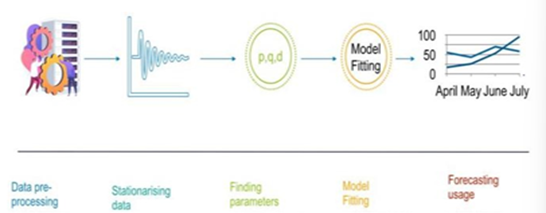Predicting Power Consumption of Individual Household using Machine Learning Algorithms
Main Article Content
Abstract
Climate change, as known, is the dangerous environmental effect we are going to face in the near future and electricity contributes the majority of its part in overcoming climate change as per the trends. Usage of electricity is widely increasing all over the world mainly as an alternative to the use of fossil fuels. In households the usage is rapidly increasing day by day, owing to the increase in the number of devices running on electricity. As we have observed mainly after the relaxation of the lockdown the bills received by households, especially in cities were unhappy and have left most of the people aghast. It is evident that users have no idea about the power they consume. In this work, a model to forecast the electricity bill of household users based on the previous trends and usage patterns by making use of machine learning techniques has been proposed. The historical data of the user is studied and the learning is done iteratively to improve the accuracy of the model. The model can then be used to forecast the consumption beforehand.
Article Details
References
Sieminski A. International energy outlook. Energy Information Administration (EIA); 2017. p. 5-30.
Ugursal, V.I. Energy Consumption, Associated Questions and some Answers. Appl. Energy 2014, 130, 783–792.
Beckel C, Sadamori L, Staake T, Santini S. Revealing household characteristics from smart meter data. Energy 2014;78: 397-410.
Tae-Young Kim, Sung-Bae Cho, Predicting residential energy consumption using CNN-LSTM neural networks, Elsevier Ltd, pp: 72-82.
Streimikiene, D. Residential Energy Consumption Trends, Main Drivers and Policies in Lithuania. Renew. Sustain. Energy Rev. 2014, 35, 285–293.
Zuo, J.; Zhao, Z.Y. Green Building Research- Current Status and Future Agenda: A review. Renew. Sustain. Energy Rev. 2014, 30, 271–281.
Deb C, Zhang F, Yang J, Lee SE, Shah KW. A review on time series forecasting techniques for building energy consumption. Renew Sustain Energy Rev 2017;74:902-24.
Arghira N, Hawarah L, Ploix S, Jacomino M. Prediction of appliances energy use in smart homes. Energy 2012;48(1):128-34.
Chujai P, Kerdprasop N, Kerdprasop K. Time series analysis of household electric consumption with ARIMA and ARMA models. Proc. of the Int. MultiConf. of Engineers and Computer Scientists 2013;1:295-300.
Oveis Abedinia, Nima Amjady and Hamidreza Zareipour. A new feature selection technique for load and price forecast of electrical power systems, IEEE transaction on power system, pp.1-11,2016.
Zhiyong Du, Xianfang wang, Liyuan Zheng and Zhulin Zheng. Nonlinear system modeling based on KPCA and MKSVM, International colloquium computing, communication, control and management, pp 1-4, 2009.
Dong, B.; Cao, C.; Lee, S.E. Applying Support Vector Machines to Predict Building Energy Consumption in Tropical Region. Energy Build. 2005, 37, 545–553.
Xiao, Z.; Ye, S.-J.; Zhong, B.; Sun, C.-X. ”BP neural network with rough set for short term load forecasting”, Expert Syst. Appl. 2009, vol 36, pp 273-279.
Ahmad, M.W.; Mourshed, M.; Rezgui, Y. Trees vs Neurons: Comparison between Random Forest and ANN for High-resolution Prediction of Building Energy Consumption. Energy Build. 2017, 147, 77– 89.
Lee, D.; Kang, S.; Shin, J. Using Deep Learning Techniques to Forecast Environmental Consumption Level. Sustainability 2017, 9, 1894.
Greff K, Srivastava RK, Koutník J, Steunebrink BR, Schmidhuber J. LSTM: a search space odyssey. IEEE Trans. on Neural Networks and Learning Systems 2017;28(10):2:222-32
A. Sahebalam, Soosan Beheshti, Wael Khreich, Edward W. Nidoy, A Novel Approach in Household Electricity Consumption Forecasting, 2016 IEEE Canadian Conference on Electrical and Computer Engineering (CCECE).
Munaf, R. Nafeena Abdul, et al. "An ML Approach for Household Power Consumption." 2022 International Conference on Sustainable Computing and Data Communication Systems (ICSCDS). IEEE, 2022.
Himeur, Yassine, et al. "Building power consumption datasets: Survey, taxonomy and future directions." Energy and Buildings 227 (2020): 110404.
Chou, Jui-Sheng, and Abdi Suryadinata Telaga. "Real-time detection of anomalous power consumption." Renewable and Sustainable Energy Reviews 33 (2014): 400-411.
Yang, Wangwang, et al. "A combined deep learning load forecasting model of single household resident user considering multi-time scale electricity consumption behavior." Applied Energy 307 (2022): 118197.
Casella, Enrico, Eleanor Sudduth, and Simone Silvestri. "Dissecting the problem of individual home power consumption prediction using machine learning." 2022 IEEE International Conference on Smart Computing (SMARTCOMP). IEEE, 2022.
Kim, Tae-Young, and Sung-Bae Cho. "Predicting residential energy consumption using CNN-LSTM neural networks." Energy 182 (2019): 72-81.
Shin, Sun-Youn, and Han-Gyun Woo. "Energy Consumption Forecasting in Korea Using Machine Learning Algorithms." Energies 15.13 (2022): 4880.
Yan, Ke, Xiaokang Zhou, and Jinjun Chen. "Collaborative deep learning framework on IoT data with bidirectional NLSTM neural networks for energy consumption forecasting." Journal of Parallel and Distributed Computing 163 (2022): 248-255.
Tomar, Dimpal, et al. "Deep learning neural network prediction system enhanced with best window size in sliding window algorithm for predicting domestic power consumption in a residential building." Computational Intelligence and Neuroscience 2022 (2022).
Muhammad Ridwan Fathin, Yudi Widhiyasana, Nurjannah Syakrani, “Model for Predicting Electrical Energy Consumption Using ARIMA Method”, Advances in Engineering Research, volume 207, 2021, 298-303.
Ni Guo, Wei Chen, Manli Wang, Zijian Tian, Haoyue Jin, “Appling an Improved Method Based on ARIMA Model to Predict the Short-Term Electricity Consumption Transmitted by the Internet of Things (IoT)”, Hindawi, Wireless Communications and Mobile Computing Volume 2021, Article ID 6610273, 11 pages.

